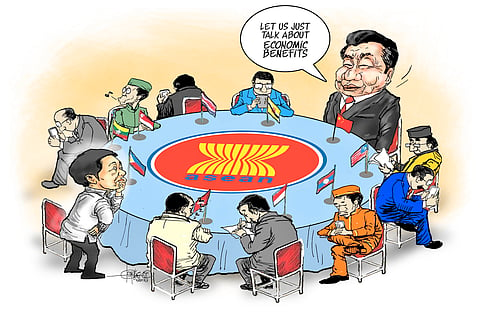
- NEWS
- the EDIT
- COMMENTARY
- BUSINESS
- LIFE
- SHOW
- ACTION
- GLOBAL GOALS
- SNAPS
- DYARYO TIRADA
- MORE

At the recent 43rd ASEAN Summit, China was on a charm offensive as it underlined the need to give attention to ramping up trade in the region instead of highlighting frictions.
President Ferdinand "Bongbong" Marcos Jr. spearheaded the call for "unilateral and assertive activities" in the West Philippine Sea to stop while imploring the ASEAN to become an influential force in maintaining peace and stability in the region.
He called for faster progress in the negotiations for a Code of Conduct that will bind disputing nations. The pact has been on the negotiating table for two decades, with contentious points stemming mainly from China's insistence on the historical basis for its territorial waters.
China recognizes the United Nations Convention on the Law of the Sea but not the 2016 Permanent Court of Arbitration award invalidating its nine-dash line demarcation on the disputed maritime area.
The contradictory position, since the PCA ruling was entirely based on the provisions of UNCLOS, had thrown off the discussions, frustrating hopes for an immediate solution to the disputes.
China cannot evade the demand for it to take the responsible path of acceding to rules that put order to international friction since the alternative is armed confrontation.
Instead of squaring with ASEAN on the CoC, Chinese Premier Li Qiang tried to seduce members of the regional bloc to consider the economic benefits of not offending Beijing.
Instead, it offered to step up on its proposed ASEAN-China free trade agreement, which will be a deal slanted to its benefit since it will seek to negate the impact of a common market set for 2025 in the ASEAN Economic Community.
Li regaled nations in the world's fastest-growing region of the benefits of maintaining stable relations with the top trading economy in the area.
ASEAN operates on the principle of consensus instead of a democratic vote, which means that crucial issues such as sea friction are not put into a vote.
The whole body needs to agree on a point put before it, including drafting resolutions.
The process makes it slow for ASEAN to arrive at a common position, which China had exploited to the hilt.
US Vice President Kamala Harris, who was in the assembly in President Joe Biden's stead, had an irrelevant role as she tiptoed the West Philippine Sea question by citing the strategic importance of America's security and relations with Southeast Asia "to both sides."
Before the closed-door summit, her address did not carry any of the usual strident US criticism of China's aggressive actions nor mention a position on the new ten-dash line map.
Marcos made the fiercest position regarding the regional rift, expressing his alarm over recent hostile moves in the disputed waters without naming any country.
Last August, a Chinese coast guard ship used a water cannon to spray a Philippine Navy vessel bringing supplies to Filipino forces in the disputed Ayungin Shoal.
"We do not seek conflict, but it is our duty as citizens and as leaders to always rise to meet any challenge to our sovereignty, to our sovereign rights, and our maritime jurisdictions in the South China Sea," Marcos said before fellow leaders in an ASEAN-only meeting on Tuesday.
Marcos raised the same issues with the Chinese premier in a diplomatic manner. "We reaffirm our commitment to the rule of law and peaceful settlement of disputes."
The nagging question confronting the body was the absence of a common position through a resolution regarding the West Philippine Sea conflict.
ASEAN leader and host Indonesia did not express any alarm over the Chinese coast guard's actions, which the Philippines and other Western and Asian nations vehemently opposed.
Li was the guest of honor in the launch of Southeast Asia's first bullet train, which connects two Indonesian cities as part of China's Belt and Road infrastructure initiative.
Marty Natalegawa, a respected former foreign minister of Indonesia, called ASEAN's failure to condemn China's aggressive acts "a deafening silence."
China proves that it has immense leverage in the region, which, sadly, it uses merely to protect its self-interest instead of exercising leadership in resolving differences.
